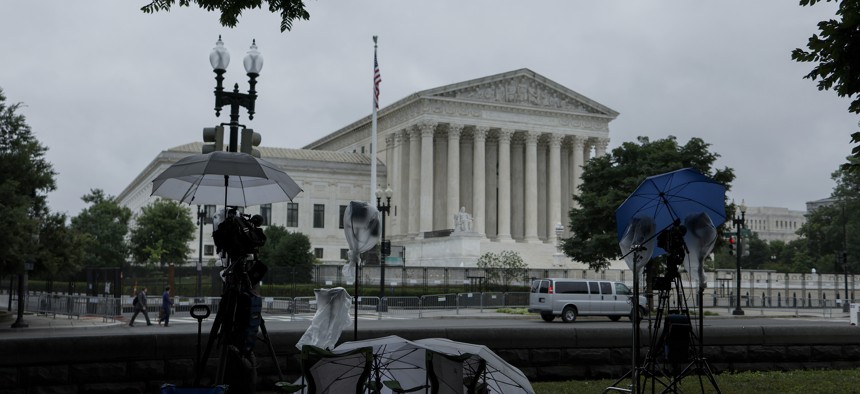Connecting state and local government leaders
The 6-3 decision does not eliminate the the rights. But legal experts say it will make it harder to hold law enforcement accountable if they don't provide the warning, which is meant to protect people taken into custody against self-incrimination.
The U.S. Supreme Court ruled Thursday that law enforcement officials can't be sued if they fail to warn suspects of their Miranda rights before an interrogation and then use those statements in court.
The warning—familiar to many Americans from televised police procedurals—advises people in custody that they have "the right to remain silent" and to have a lawyer present during questioning.
The 6-3 court decision does not eliminate the right. But civil rights lawyers say it will make it harder to enforce because individuals who were not provided with a Miranda warning will now be unable to bring a civil lawsuit under a federal statute known as Section 1983, which allows people to sue the police for infringement of their constitutional rights.
"The ruling licenses violations of constitutional rules by taking away accountability for the officers involved," said David Shapiro, a law professor at Northwestern University and an attorney with the McArthur Justice Center.
"Damages are important to compensate people who have been wronged," Shapiro added. "They're also important to provide disincentives to violating rights going forward. By taking away these opportunities to hold law enforcement responsible for constitutional violations...the court is ultimately undermining the Constitution itself."
Justice Samuel Alito, writing for the majority, said failing to advise suspects of their Miranda rights "is not itself a violation of the Fifth Amendment," which protects against self-incrimination. He said the court sees "no justification for expanding Miranda to confer the right to sue."
Justice Elena Kagan and two other liberal justices dissented, saying the decision will preclude people from seeking a remedy for violations of their Miranda rights.
The State and Local Legal Center, representing a coalition of groups including the National Association of Counties, National League of Cities, International Municipal Lawyers Association, National Sheriffs’ Association, Major County Sheriffs of America and California State Association of Counties, filed a friend of the court brief arguing against the right to sue.
While Section 1983 "plays an important and undisputed role in ensuring compensation for those whose federal rights are infringed by state officers,'' the brief states, it "imposes significant burdens on local governments and their employees—burdens that should weigh heavily against any judicial expansion of [Section] 1983 beyond its statutorily defined scope."
Local governments face an "enormous flood of [Section] 1983 litigation,'' often resulting in large monetary judgements against communities, the brief added. "For cash-strapped local governments, these costs can often cause severe financial difficulties, destroying municipal budgets and siphoning funds away from other much-needed local priorities.''
The brief filed by the State and Local Legal Center acknowledges the importance of Miranda rights for those accused of crimes. But instead of permitting suspects who were not properly warned to sue, justice would be better served by excluding statements obtained in violation of Miranda.
The ruling comes as many communities are examining the tactics used by police.
"A lot of people have heard of the doctrine of qualified immunity which is another limitation on monetary damages when suing the police,'' Shapiro said. Thursday's decision is "another illustration of the 6-3 majority in the Supreme Court really curtailing opportunities to hold law enforcement accountable for violations of civil rights."
Miranda rights have been part of police procedure for nearly six decades, noted Brett Max Kaufman, a senior staff attorney with the American Civil Liberties Union.
"By denying people whose rights are violated the ability to seek redress under our country’s most important civil rights statute, the court further widens the gap between the guarantees found in the Constitution and the Bill of Rights and the people’s ability to hold government officials accountable for violating them,'' he said in a statement. The ACLU filed an amicus brief in support of the plaintiff in the case.
The case before the court, Vega v. Tekoh, involved a hospital worker from California, Terrence Tekoh, who was accused of sexually assaulting a patient. He was interrogated by Los Angeles County Sheriff’s Deputy Carlos Vega, who did not read Tekoh his rights.
Later, during the trial, Tekoh's statements were used by prosecutors. He was acquitted and then sued Vega for violating his civil rights.

NEXT STORY: How Cities Can Respond to Extreme Heat



